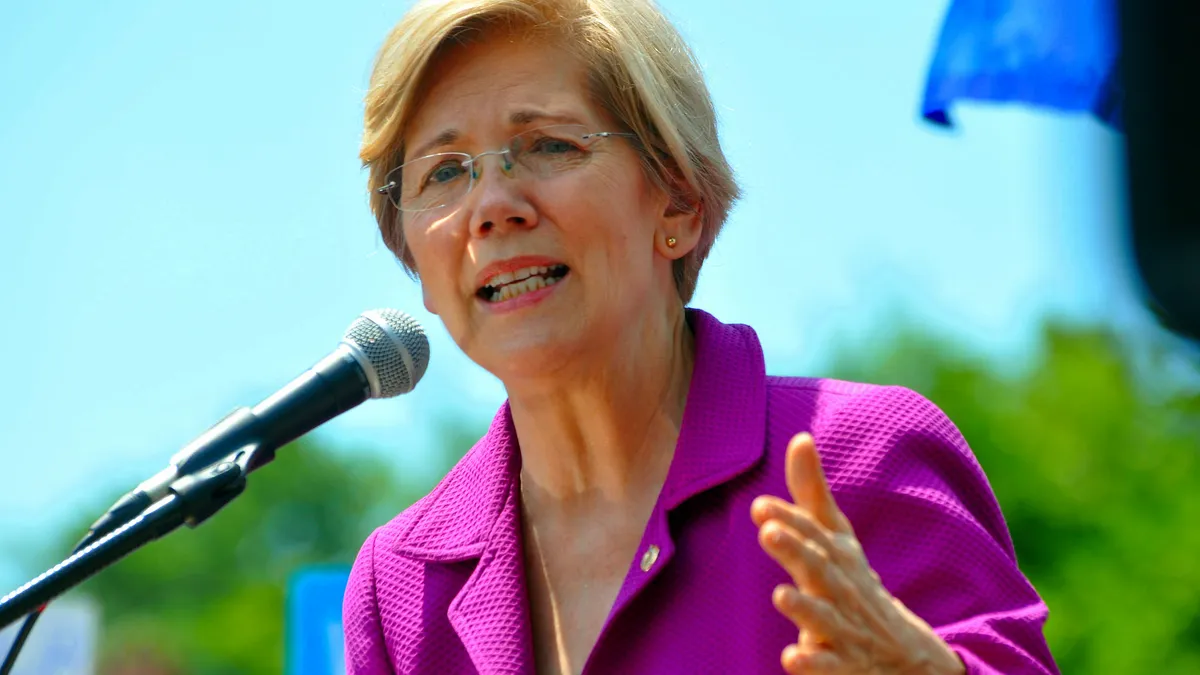Less than a month into his tenure leading the Office of the Comptroller of the Currency (OCC), Acting Comptroller Michael Hsu said he’d review three crypto-related interpretive letters issued by his Trump-era predecessor, Brian Brooks: one allowing national banks to provide crypto custody service; one governing banks’ cash reserves backing stablecoins; and one allowing banks to use distributed ledger technology and stablecoins to facilitate payments.
Hsu said at the time that he sought to build alignment on cryptocurrency policy in collaboration with the Federal Deposit Insurance Corp. (FDIC) and the Federal Reserve. The effort culminated in November with a joint interpretive letter that gave Brooks’ guidance the green light so long as banks alerted their regulators of their plans ahead of time and could show they’d operate safely and soundly.
That, apparently, is not enough in the eyes of Sen. Elizabeth Warren, D-MA, who last week asked the OCC not only to rescind Brooks’ three interpretive letters but the November joint guidance as well, according to a letter, co-signed by Sens. Bernie Sanders, I-VT; Dick Durbin, D-IL; and Sheldon Whitehouse, D-RI.
"The interpretive letters issued under your predecessor essentially granted banks unfettered opportunity to engage in certain crypto activities and remains problematic," Warren wrote. “We are concerned that the OCC has failed to properly address the shortcomings of the preceding interpretive letters and the risks associated with crypto-related banking activities, which have grown more severe in recent months.”
Bitcoin’s value, for example, has dropped 60% since the OCC, FDIC and Fed issued their interagency guidance — which, at two pages, may have surprised some observers with its brevity. The agencies did, however, indicate they had identified a number of areas where additional public clarity was warranted.
“Throughout 2022, the agencies plan to provide greater clarity on whether certain activities related to crypto-assets conducted by banking organizations are legally permissible, and expectations for safety and soundness, consumer protection, and compliance with existing laws and regulations,” the OCC, FDIC and Fed said.
Warren’s letter may, in essence, challenge the regulators to follow through — especially in light of the May collapse of the TerraUSD stablecoin and the July bankruptcies of Voyager Digital and Celsius.
In the letter, Warren asks the OCC to coordinate with the Fed and FDIC “to develop a comprehensive approach that adequately protects consumers and the safety and soundness of the banking system.”
An aide to Warren told Bloomberg the senator is asking fellow lawmakers to sign on to the letter.
Hsu said Thursday he hadn’t seen it yet but looked forward to responding.
“I am a very strong believer that anything that comes into the banking system in crypto has to be safe, sound and fair, and we’re going to do what’s necessary in a way that’s sustainable, durable, robust,” he told Bloomberg on Thursday. “I think we’re doing a pretty good job. See Exhibit A: a whole bunch of stuff just happened, and the banking system is in pretty good shape, knock on wood. I think part of that is the actions we’ve taken.”
In June at a DC Blockchain Summit, Hsu defended the interagency guidance, saying it had "contributed to the safety and soundness of the banking system despite the heightened volatility and recent turmoil in the crypto markets."
"The resilience of the traditional banking system to the recent events in crypto is not an accident," Hsu said, according to American Banker. "Rather, it is due, at least in part, to federal bank regulators' continued and intentional emphasis on safety and soundness and consumer protection."














